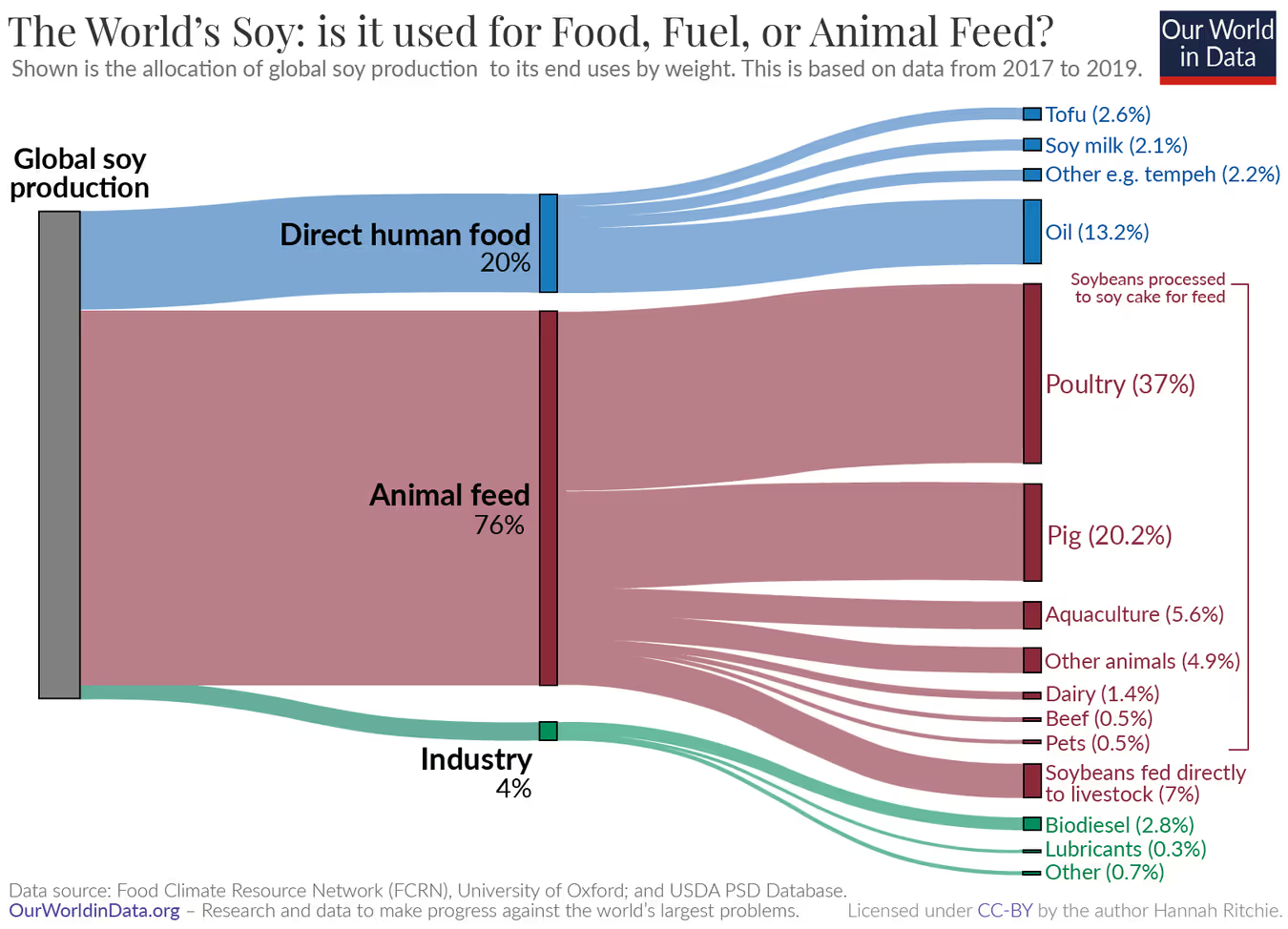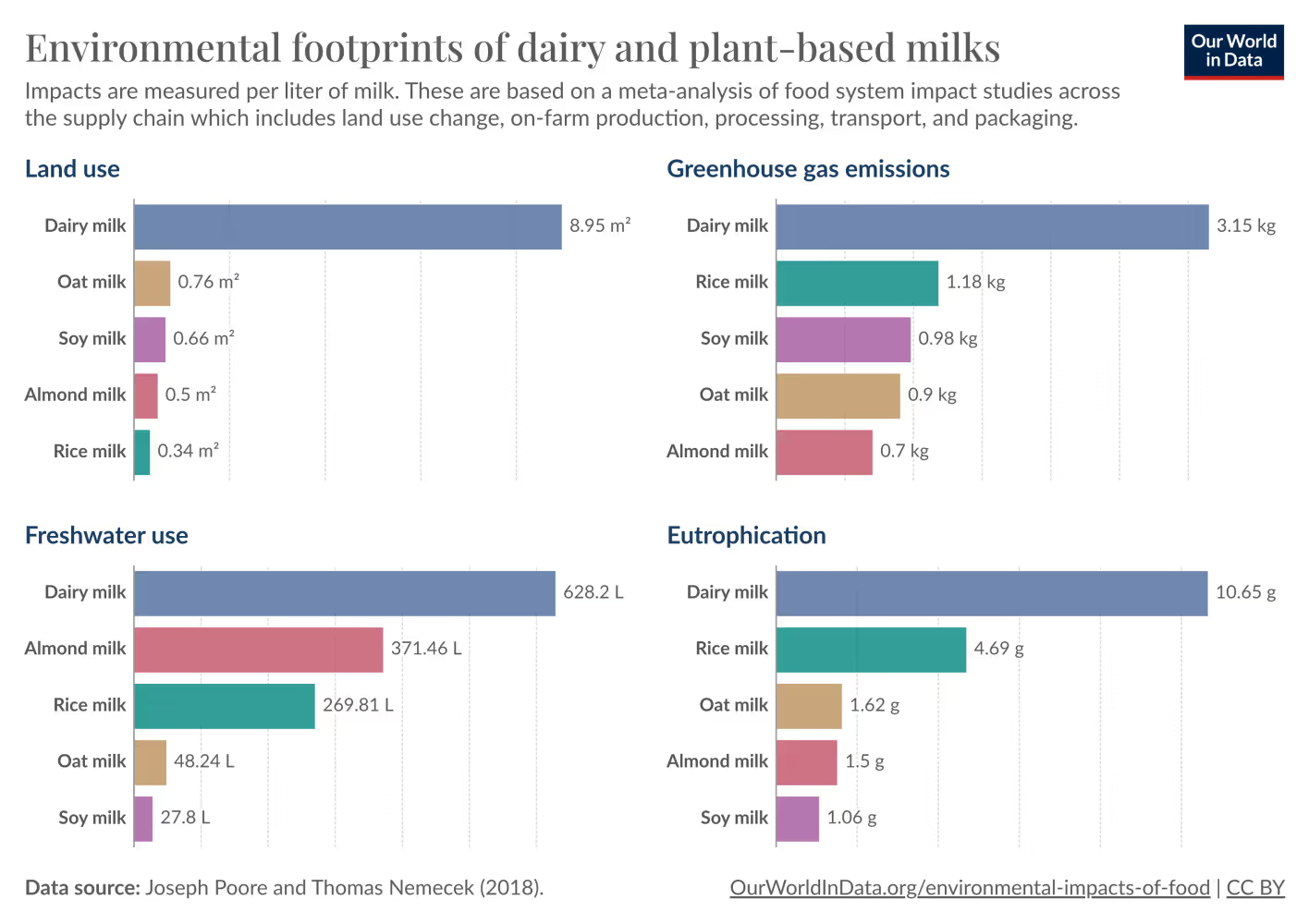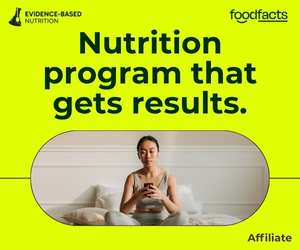
‘Going vegan destroys the environment’ says Fox News. Is there evidence of this?





Coral Red: Mostly False
Orange: Misleading
Yellow: Mostly True
Green: True
Learn more about our fact-checking policies
In a media article published by Fox News on 6 February 2024, Jason Reed makes claims about the effects of plant-based foods on the environment. This analysis seeks to review these claims against current research findings and includes insights from experts in the field.
Scientific evidence shows plant-based diets have a much lower environmental footprint than meat-heavy diets, with reduced emissions, water, and land use, and that most soy is used for animal feed, not human consumption.
While acknowledging that all food production has some environmental cost, it's crucial to address the inaccuracies propagated by the article. Misinformation harms public health and delays necessary behaviour change to protect planetary health, here by making the adoption of a plant-based diet seem trivial and uninformed.

Check the source: Always verify the source of the information. In this case, by checking the WWF's website (quoted in the Fox News article), we quickly notice that only one part of the information on soy was selected to support a narrative.
1. CLAIM: "Never before have millions of people become herbivores.”
Fact Check: This statement is not supported by recent findings; new evidence from archaeologists shows that some early human hunter-gatherers ate mostly plants and vegetables, undermining the commonly held view that all our ancestors followed meat-heavy diets.
In the past, millions of people ate plant-based diets around the world, particularly in South Asia. Ancient Vedic texts encourage people to avoid animal foods. More generally, humans, for most of our history, lived on mostly plant diets. Never before have humans eaten this much animal food.
2. CLAIM: “By giving up meat, [you] might actually be harming the planet.”
Fact Check: Studies consistently show that a plant-based diet has a significantly lower carbon footprint compared to a diet rich in animal products. The meat and dairy industries are major contributors to greenhouse gas emissions, deforestation, and water pollution; a recent analysis by the University of Oxford found that vegan diets have just 30% of the environmental impact of high-meat diets.
3. CLAIM: “Meat, eggs, and dairy are all top sources of protein.”
Fact Check: It is true that meat, eggs, and dairy all provide protein. The implication of this statement is that animal sources of protein, like meat and eggs, are superior. This is a widely shared assumption which stems from the fact that animal proteins are considered complete proteins, meaning they contain all nine essential amino acids needed by the body. However, the implication that this makes animal protein superior is misleading, because it overlooks important aspects of research on protein sources and health outcomes. For example, research indicates diets high in plant protein are associated with better health outcomes than animal protein, such as healthier ageing in women, and reduced risk of metabolic syndrome. The source of protein and the method of preparation are also important factors. Red and processed meats are associated with an increased risk of several cancers, heart disease, and all-cause mortality. The article suggests that a diet without animal foods is limited to “beans at every meal.” However, nutritionists conclude that there is a wide variety of protein-rich plant foods to choose from to meet nutritional needs.
The reasons [plant-based proteins are associated with better health] are likely due to the healthier nutrient packaging of plant sources of protein, which results in better cardiometabolic health and lower levels of inflammation.
4. CLAIM: “Soybeans are destroying the planet” through deforestation, soil erosion, and water usage.
Fact Check: It is true that soybean farming has its environmental costs, but the details are far more nuanced than the author indicates. The article states that soy is so bad that “even the WWF, an environmental NGO, is against it.” However, this is what the WWF states: “Few of us are aware of how much soy we eat - because we tend to consume it indirectly. We may not eat large quantities of soy directly, but the animals we eat or from which we consume eggs or milk do. In fact, almost 80% of the world’s soybean crop is fed to livestock, especially for beef, chicken, egg and dairy production.” This is a typical example of the “cherry-picking fallacy”, where the bits of the ‘evidence’ which support an argument get selected, while the rest is left out. What the Fox News article fails to point out here is that most soybeans are not grown for direct human consumption. If, as Jason Reed suggests, one wants to reduce their consumption of soy, and if the majority of soybean production is used for animal feed, then reducing meat consumption would be an efficient way to mitigate these environmental issues.

5. CLAIM: Meat substitutes, such as tofu and tempeh, made from soybeans are environmentally damaging.
Fact Check: Meat substitutes made from soybeans generally have a lower environmental footprint compared to their animal-based counterparts. For example, research indicates that protein from tofu (soybeans) is much more resource-efficient than from beef or eggs. It requires 74 times less land and 8 times less water than beef, with 25 times lower greenhouse gas emissions and eutrophication potential (a process where water bodies become overly enriched with nutrients, leading to excessive algae growth and water quality degradation) is reduced by 39 times. Compared to eggs, tofu production needs three times less land, six times less water, halves the greenhouse gas emissions, and lowers eutrophication potential by five times.
Additionally, there are a variety of plant-based protein sources beyond soy, such as legumes, nuts, and seeds, which can provide the necessary protein in a plant-based diet without relying solely on soybeans. A huge body of research shows the environmental benefits of switching from animal-based diets to those rich in either whole plant foods or incorporating processed plant-based alternatives; in a recent analysis, these types of plant-based diets substantially reduce greenhouse gas emissions by 30–52%, land use by 20–45%, and freshwater use by 14–27%.
6. CLAIM: Plant-based milk alternatives like almond, coconut, oat, rice, and soy milk have disastrous environmental consequences.
Fact Check: Plant-based milk options have a much lower environmental footprint compared to dairy milk. Research from 2018, published in the journal Science, shows that all plant-based milk options have a lower impact than dairy across all metrics. Compared to plant-based alternatives, cow’s milk causes around three times as much greenhouse gas emissions, uses around ten times as much land, two to twenty times as much freshwater, and creates much higher levels of eutrophication.

7. Claim: Millennials and Gen Z who adopt a plant-based diet have been duped by the eco-food industry.
Fact Check: The shift towards plant-based diets among younger generations is driven by various factors, including concerns about animal welfare, health, and the environment. This type of language reduces the younger generations to people who can’t think for themselves when in reality, many people choose these dietary choices based on critical thinking skills and intelligent reasoning. To suggest that they have been ‘duped’ by the industry undermines a generation who want to see change in our food system. Choosing plant-based options can align with ethical and environmental values without being solely influenced by marketing tactics.
In Conclusion
Here is our final review for this article:
Misleading ⭐️⭐️⭐️⭐️
Factuality ⭐️
Balance
Clarity ⭐️⭐️⭐️
The article presents conclusions on plant-based diets and their environmental impacts that do not align with scientific evidence, and at best are misleading and at worst, inaccurate. Additionally, articles like these undermine the urgent need for evidence-based discourse.
To address concerns about soybean farming or other environmental challenges, promoting sustainable dietary choices is crucial. This includes reducing reliance on animal products, mitigating environmental strain and aligning with ethical and health considerations.
This is truly a shameful moment for research in mainstream news that a lot of Americans consume.
Stand Against Nutrition Misinformation
Misinformation is a growing threat to our health and planet. At foodfacts.org, we're dedicated to exposing the truth behind misleading food narratives. But we can't do it without your support.
Sources
Bunge, A.C. et al. (2024). Sustainability benefits of transitioning from current diets to plant-based alternatives or whole-food diets in Sweden.
https://www.nature.com/articles/s41467-024-45328-6
Chen, J.C. et al. (2024). Stable isotope chemistry reveals plant-dominant diet among early foragers on the Andean Altiplano, 9.0–6.5 cal. ka.
https://journals.plos.org/plosone/article?id=10.1371/journal.pone.0296420
Farvid, M.S. et al. (2021). Consumption of red meat and processed meat and cancer incidence: a systematic review and meta-analysis of prospective studies.
https://link.springer.com/article/10.1007/s10654-021-00741-9
Ritchie, H. (2021). Drivers of Deforestation.
https://ourworldindata.org/drivers-of-deforestation
Shang, X. et al. (2017). Dietary protein from different food sources, incident metabolic syndrome and changes in its components: An 11-year longitudinal study in healthy community-dwelling adults.
https://www.sciencedirect.com/science/article/abs/pii/S026156141631264X
The Guardian (2024). Hunter-gatherers were mostly gatherers, says archaeologist.
https://www.theguardian.com/science/2024/jan/24/hunter-gatherers-were-mostly-gatherers-says-archaeologist
Tufts Now (2024). Diets Rich in Plant Protein May Help Women Stay Healthy as They Age.
https://now.tufts.edu/2024/01/17/diets-rich-plant-protein-may-help-women-stay-healthy-they-age
University of Oxford Medical Sciences Division (2023). Vegan diet has just 30% of the environmental impact of a high-meat diet, major study finds.
https://www.medsci.ox.ac.uk/news/vegan-diet-has-just-30-of-the-environmental-impact-of-a-high-meat-diet-major-study-finds
University of Oxford (2021). Red and processed meat linked to increased risk of heart disease, Oxford study shows.
https://www.ox.ac.uk/news/2021-07-21-red-and-processed-meat-linked-increased-risk-heart-disease-oxford-study-shows
WWF. Soy.
https://wwf.panda.org/discover/our_focus/food_practice/sustainable_production/soy/
Zhong, V.W. et al. (2020). Associations of Processed Meat, Unprocessed Red Meat, Poultry, or Fish Intake With Incident Cardiovascular Disease and All-Cause Mortality.
https://jamanetwork.com/journals/jamainternalmedicine/fullarticle/2759737


foodfacts.org is an independent non-profit fact-checking platform dedicated to exposing misinformation in the food industry. We provide transparent, science-based insights on nutrition, health, and environmental impacts, empowering consumers to make informed choices for a healthier society and planet.

Was this article helpful?


















.svg)
